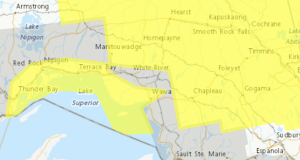 Premier Doug Ford is pressing the federal government to immediately lay out a plan to fund provincial priorities, including responding to future waves and surges of COVID-19, strengthening health and long-term care, increasing testing and quarantine enforcement at the border, and making strategic investments in infrastructure projects to spur long-term recovery.
Premier Doug Ford is pressing the federal government to immediately lay out a plan to fund provincial priorities, including responding to future waves and surges of COVID-19, strengthening health and long-term care, increasing testing and quarantine enforcement at the border, and making strategic investments in infrastructure projects to spur long-term recovery.
The Premier was joined today by Christine Elliott, Deputy Premier and Minister of Health, in calling for an increase to the Canada Health Transfer to cover at least 35 per cent of provincial-territorial health spending starting this year. The funding will be used to enhance the province’s fall preparedness plan and help end hallway health care. The Ontario government is making an unprecedented investment of $67 billion in health care this year.
“As we prepare for future surges and waves of COVID-19, we have to be nimble and able to respond immediately to any change in the public health trends,” said Premier Ford. “That’s why I’m calling on the Prime Minister to meet the urgent needs of the provinces and territories with an additional $28 billion through the Canada Health Transfer. A strong health care system is the foundation on which we can build a strong economic recovery for Ontario and for the country.”
The pandemic further underscored the need for increased investment in the long-term care sector. Ontario is calling on the federal government to provide immediate and ongoing supports to long-term care residents and those who care for them, including investments for staffing, infection prevention and control, and infrastructure funding to help build new beds and redevelop existing ones to provide quality homes for vulnerable seniors. The Ontario government is investing over $4.8 billion in long-term care this year.
“While our best defence continues to be our everyday actions to stop the spread of COVID-19, including practising physical distancing, wearing face coverings and staying home when ill even with minor symptoms, we require the necessary resources to prepare for the worst should it come,” said Minister Elliott. “This includes dramatically expanding our testing capacity, launching more testing locations and adding more case and contact management resources to trace and isolate new cases.”
Enforcing public health rules at the border is critical to help contain and prevent the spread of COVID-19. That’s why the Ontario government is asking Ottawa to play a more active role in testing and enforcing quarantine measures in order to keep Ontarians safe. Increasing testing and screening at the border and hiring additional federal staff to enforce the quarantine rules are necessary, especially with case numbers on the rise. The province is also calling on the federal government to ensure an effective strategy is in place to expand testing and screening at the border before any restrictions are loosened.
As Ontario continues down the road to recovery, key investments in infrastructure projects across the province will help restart the economy and create jobs. The province is calling on the federal government to invest an additional $10 billion per year over 10 years in infrastructure. Ontario alone has nearly $10 billion in shovel-ready infrastructure projects over and above the approximately 750 submissions to the federal Investing in Canada Infrastructure Program.
Additionally, Ontario has four nationally significant subway projects in the Greater Toronto Area with a total value of $28.5 billion that will support over 22,000 jobs and reduce annual emissions by over one million tonnes.
Ontario also has over 360 shovel-ready projects not yet approved by the federal government. The province is looking to the federal government to help quickly remove roadblocks to these projects and expedite approvals so communities can start building right away and get people working again.
The province is further calling on the federal government to make additional investments to expand and improve broadband service in more unserved and underserved communities. Improved access to high-speed Internet and reliable cellular service will help schools and skills training providers deliver remote learning, allow businesses in communities across the province to adapt and fully participate in the digital economy, contribute to public safety, and improve the quality of life for residents in these communities.
Ontario stands ready to work with the federal government and its provincial partners to deal with a potential second wave of COVID-19 and keep people safe, while ensuring the province and country can chart a path to a strong, resilient economic recovery.
- Ontario Fast-Tracks Kinross Gold’s Great Bear Project Under ‘One Project, One Process’ - February 17, 2026
- Ontario and Marten Falls First Nation Sign Historic Agreement to Unlock Ring of Fire - November 28, 2025
- Ontario Investing in Winter Roads Network - November 25, 2025
 Wawa-news.com Local and Regional News
Wawa-news.com Local and Regional News

